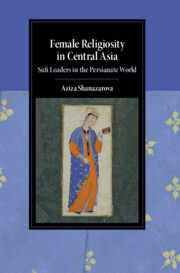‘This ground-breaking study, well documented and well written, adds new and surprising facets to the history of Islam in Central Asia: unexpected insight into the gender aspects of Sufism in the region. An important contribution, central for students of Islam and also for those interested in gender studies.’
Jürgen Paul - Universität Hamburg
‘This book represents exemplary scholarship in Islamic studies. Rooted in overlooked archival materials, it contains a rich and nuanced analysis of the conjunction between gender, age, religious expression and authority, and the evolution of social memory over a long period. It is also an essential new resource for the study of Central Asia’
Shahzad Bashir - Brown University
‘A groundbreaking, meticulously researched work. It represents a major contribution to scholarship on Islam in Central Asia and on the role of women as authority figures, with implications that go far beyond its geographical focus.’
Jamal J. Elias - University of Pennsylvania
‘Shanazarova’s groundbreaking book offers a reassessment of the prevailing understanding of gender history in early modern Central Asia through her astute analysis of the narrative traditions of a little-known sixteenth-century female Sufi master, Aghā-yi Buzurg, who lived in Bukhara during the post-Timurid era of Shibānid rule in Central Asia and the rise of the Shīʿī Safavid dynasty in Iran. This book is a must-read for scholars and students of women and gender, Sufism, and narrative traditions in early modern Central Asian and Islamic history.’
Jo-Ann Gross - Professor Emerita, The College of New Jersey
‘Shanazarova’s deeply researched and highly original study of a 16th-century female Sufi master opens astounding insights into the study of women and religious authority in Islamic Central Asia. Female Religiosity represents a major contribution to early modern Central Asian history.’
Scott C. Levi - The Ohio State University



